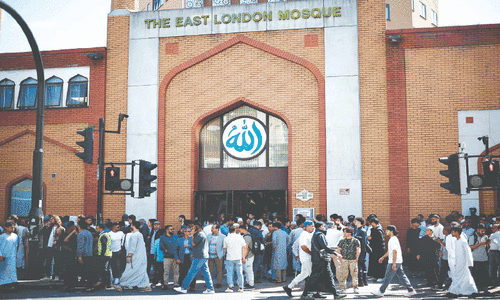BELFAST: A week of racism-fuelled disorder in Northern Ireland, sparked by disturbances in English towns and cities, is proving harder to end, with fears the UK region’s sectarian divisions are feeding into the violence.
“They burned every single thing, there is nothing left inside, just ashes,” said Bashir, whose supermarket in Belfast was torched during attacks against foreign-owned shops and businesses. A mosque in a town near Belfast was also targeted late on Friday.
“We are scared at what may happen next, there is lots of hostility against the Muslim community,” said the 28-year-old from Dubai, who did not want to give his full name citing safety reasons.
Northern Ireland has seen nightly unrest, mainly in pro-UK loyalist neighbourhoods, that began after an anti-immigration protest in Belfast on August 3.
The violence has mirrored disorder across England, spurred by misinformation spread on social media about the suspected perpetrator of a knife attack in Southport on July 29 which killed three children.
The Police Service of Northern Ireland (PSNI) said that 31 people had been arrested during the disturbances. “On a fundamental level the Belfast attacks are similar in its dynamic to anti-immigration protests in white working-class areas in England, the Republic of Ireland and elsewhere in Europe,” said Peter McLoughlin, a politics lecturer at Queens University Belfast.
“It is driven by racism and fear of the other, but in Northern Ireland it also interfaces with sectarian political dynamics,” he said.
‘Under attack’
Three decades of violent sectarian conflict known as the “Troubles” largely ended in 1998, but bitterness and friction persists between pro-UK Protestant loyalists and pro-Irish unity Catholic nationalists.
Outside Bashir’s smoke-scarred shopfront in the staunchly loyalist inner-city district of Sandy Row, British Union Jack flags flutter on lampposts and painted wall murals proclaim fierce allegiance to the UK.
“Within loyalism there is a sense that prevailed through Northern Ireland’s peace process that their community is in retreat, that their community and British identity is under attack,” McLoughlin explained.
Many loyalists feel they “must oppose outsiders coming into those areas, who are seen as taking supposedly Protestant jobs and houses, and encroaching on a community that was once dominant”, he added.
After last Saturday’s anti-immigration protest, rioters rampaged through streets looking for foreign-owned businesses to attack. “What happened last week was crazy,” Yilmaz Batu, a 64-year-old Turkish chef who has been living in Northern Ireland for two years, said.
“There was never any trouble before,” he said, sitting at the Sahara Shisha Cafe, one of several Middle Eastern and Turkish-owned businesses near Sandy Row that were hit.
The Northern Ireland Muslim Council said in a statement that “the vast majority of the violence has been whipped up and fuelled by deliberate misinformation and disinformation on social media”. “False and dangerous narratives” about Muslims who “constitute a small minority in Northern Ireland” led to the attacks, it added.
The disorder was “extremely shocking for the wider community”, said Fiona Doran, chair of the United Against Racism group which co-organised a solidarity rally in Belfast on Saturday.
Published in Dawn, August 12th, 2024














































Dear visitor, the comments section is undergoing an overhaul and will return soon.